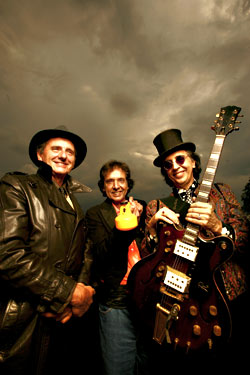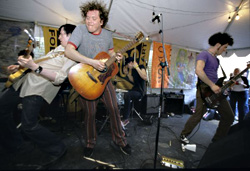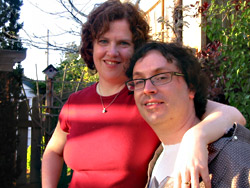Shock the system. It’s been the dream of many a rocker from the ’60s on, but few have succeeded as thoroughly as the leaders of Brazil’s Tropicália movement. Drawing suspicion from both the country’s leftists and the military regime that had triumphed in a 1964 coup, the group’s cultural challenge ultimately led to the arrest and exile of Tropicália icons Caetano Veloso and Gilberto Gil.
Os Mutantes were the kids of the scene, teenagers who’d built their own equipment and took on the emerging psychedelic-rock scene with their own sense of musical history and playfulness. The slurping noise that punctuates a line about ice cream in their 1968 version of Veloso’s “Baby” is a great joke, but the Mutants were also there at some more threatening moments. In a scathingly received festival performance now regarded as Tropicália’s equivalent of Dylan’s “Judas” moment, they backed Veloso on an enraged “É Proibido Proibir” (“It is forbidden to forbid”).
Guitarist Sérgio Dias, who along with brother Arnaldo Baptista made up two-thirds of the original Mutantes lineup, laughs as he considers why they and singer Rita Lee weren’t likewise taken into custody. “Can you imagine how would they give a reason to arrest Rita?” Dias says from his São Paulo home. “You know, little blonde, blue eyes, sweet face. And me, a teenager, like 16 years old. What is the crime, you know? So we got away with it somehow.”
Dias acknowledges the “cat and mouse” strategy both sides used, however. “So many times we had to stop the gigs and leave because they said they were going to raid the place. Or other times we couldn’t leave the hotel because they were ready to take us. On the other hand, we were very young, and that’s what gives you a sense of indestructibility and immortality, which is great. So we laughed at it; that’s what’s great, because we weren’t really intimidated by anything. We were really laughing our heads off at them.”
Even the band’s approach to masking its social criticisms had a gamelike element. “Normally when we got censored, instead of changing the lyrics we mutilated them—we put a noise on the recording. For example, if you listen to ‘Dom Quixote,’ there’s a clapping like applause where it says ‘yellow and green’ because we couldn’t say the colors of our flag.” The song’s true intent traveled by rumor. “All of this came mouth to mouth, so everybody knew it, exactly what was going on. And in shows we would sing normally, with the words, the right lyrics.”
Mutantes’ early records melded their Brazilian roots with the Beatles’ music-as-toy-box spirit, the grooves of Sly and the Family Stone and Jimmy Smith, the nascent noise-rock of Syd Barrett’s Pink Floyd, slices of musique concrète, and Dias’ earliest guitar influence, a band of Pacific Northwest legends, as it happens.
“So good, man!” he enthuses of Tacoma-bred instrumental combo the Ventures. “Even today you listen to the things—Nokie Edwards, he’s a killer. My God, I wish I could meet this guy. He made my guitar playing. I would love to meet him. It’s great, because it’s all Nashville stuff. It’s all the techniques of finger picking, which we didn’t know that, and we were just playing with a pick.”
To listen to his rushed delivery is to understand that Dias’ enthusiasms retain their freshness to this day. The reunited Mutantes, with Dias and Baptista along with new female singer Zélia Duncan and seven other players, first appeared at London’s Barbican Arts Centre last May. “It was outrageous, man—really, really amazing. It was one of those gigs that you can count on your fingers. It was really magical,” Dias recounts, also noting that the whole thing went by in such a rush that he has no memory of the show.
Dias, of course, remains thankful for the fandom of Beck, David Byrne, and others who helped bring Mutantes to the wider fame that escaped them the first time around. The short U.S. tour that brings them to the Moore Theatre is also a source of amazement to him. “It’s a new experience, because if we were doing these shows here in Brazil, OK. [The audience there is] a new generation, but they’re also the old generation that was our same age or whatever, and that wouldn’t be anything new. But for America, for England, this is totally virgin. And the great thing of this is that we are doing this music that’s been done 30 years ago, and it is somehow affecting people now. The amazing thing is that even though the damn thing is in Portuguese, which is a weird language, somehow it is reflecting the feelings of these other generations.”








